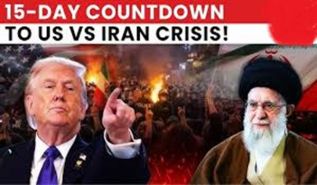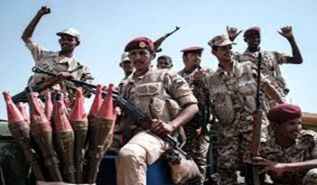بسم الله الرحمن الرحيم
Highlighting the Shariah Method Followed by Hizb ut Tahrir to Establish the State
(Translated)
Following the Prophet (saw) is an obligation, as numerous Qur'anic verses command adherence to his example, such as,
[لَقَدْ كَانَ لَكُمْ فِي رَسُولِ اللهِ أُسْوَةٌ حَسَنَةٌ]
“Indeed, in the Messenger of Allah you have an excellent example.”[TMQ Surah Al-Ahzab:21],
[قُلْ إِنْ كُنْتُمْ تُحِبُّونَ اللهَ فَاتَّبِعُونِي يُحْبِبْكُمُ اللهُ]
“Say, O Prophet, If you sincerely love Allah, then follow me; Allah will love you”[TMQ Surah Aali Imran:31],
[وَمَا آتَاكُمُ الرَّسُولُ فَخُذُوهُ وَمَا نَهَاكُمْ عَنْهُ فَانْتَهُوا]
“Whatever the Messenger gives you, take it. And whatever he forbids you from, leave it.”[TMQ Surah Al-Hashr: 7].
The current reality of Muslims today is similar to the Makkan phase of the Prophetic mission, as they live in a “Dar ul-Kufr” (Abode of Disbelief) due to being governed by laws other than those revealed by Allah (swt) and the term “Dar” is a juristic term detailed in books of fiqh (Shariah jurisprudence).
This necessitates following the Makkan method of change. The Prophet (saw) followed three main stages on his path to establishing the Islamic state:
- The stage of culturing and building the party structure:
Beginning with individual contact to spread the idea, as the Prophet (saw) did during the secret phase of the Da’wah, and organizing study circles (halaqaat) to shape well-rounded Islamic personalities.
The Hizb [ut Tahrir] began this stage in Al-Quds in 1953 under the leadership of its founder, the esteemed ‘aalim Sheikh Taqiuddin an-Nabhani (rh).
- The stage of interaction with society:
This is carried out through intellectual struggle and political activism, as well as seeking nussrah (military support) from people of power and influence. During this stage, the message is delivered collectively through lectures, seminars, and publications to confront deviant ideas and disbelieving systems just as the Prophet (saw) confronted Quraysh.
The Hizb has proceeded in this stage by focusing on intellectual struggle against the beliefs and ideas of kufr (disbelief), and political struggle against the rulers and colonialism, exposing them and adopting the issues of the Ummah in accordance with Islamic Shariah Law.
Through these actions, public opinion in society has been shaped around the Islamic call.
- The stage of taking power:
This stage comes after the success of the first two stages and the development of public opinion within the Ummah based on general awareness, along with seeking nussrah (military support) from the people of military power and protection to establish the Khilafah (Caliphate).
This is what the Prophet (saw) did, he generated public opinion and sought nussrah (military support) from the leaders of Quraysh, Ta’if, and other tribes such as Kindah and Banu Shaybah. He ultimately succeeded with the nussrah of the Ansar at the Second Pledge of al-‘Aqabah, which led to the implementation of Islam as a comprehensive way of life.
This methodology followed by Hizb ut Tahrir has given it characteristics and feature, that are lacking in all other Islamic movements and groups on the scene.
The Hizb is distinguished by its clarity and frankness. There is no compromise in confronting falsehood, while adhering strictly to political work, without resorting to violence, based on the saying of Allah (swt),
[فَاصْدَعْ بِمَا تُؤْمَرْ]
“So proclaim what you have been commanded” [TMQ Surah Al-Hijr 94].
Among the Hizb’s characteristics is patience in the face of harm, just as the Prophets (as) were patient, without calling for material force, except in cases of defending occupied Islamic lands, and with a focus on intellectual struggle and political activism.
The shabaab (men and women members) of the Hizb face many challenges, hardships, and severe oppression from the rulers, such as imprisonment, torture, travel bans and restrictions.
However, they have continued their struggle peacefully, following the example of the Prophet (saw) in Makkah.
Today, the Hizb continues its Dawah, hoping for the establishment of the Khilafah (Caliphate), with a focus on:
- Building statesmen
- Generating public opinion within the Ummah around the thoughts of Islam
- Exposing the colonialist conspiracies being plotted against the Ummah
- Adopting the true interests of the Ummah.
The Hizb affirms that its methodology is based on steadfastness in both its goal and method, while being innovative in its styles and means, all while adhering to the Method of the Prophethood for comprehensive and radical change.
Western countries also work to distort Islamic thoughts especially the political concepts that could lead to the revival of the Ummah, including casting doubt on the method that Hizb ut-Tahrir follows for change, most notably:
1- Seeking nussrah (military support) from armies: The method is accused of being unrealistic or contradictory to Islamic Shariah Law.
● The Islamic Shariah response to the method of seeking nussrah (military support) from armies
- Shariah evidences from the Qur’an and Sunnah:
- The Second Pledge of al-Aqabah: a Prophetic model for seeking support from those of military power and protection, the Aws and Khazraj, to establish the state. They pledged military protection and assistance to the Prophet (saw).
- The hadith, «أُمِرْتُ أَنْ أُقَاتِلَ النَّاسَ حَتَّى يَشْهَدُوا أَنْ لَا إِلَهَ إِلَّا اللَّهُ وَأَنَّ مُحَمَّدًا رَسُولُ اللَّهِ»“I was commanded to fight the people until they testify that there is no god but Allah and that Muhammad is the Messenger of Allah” (reported by Muslim): this affirms that change requires an executive force.
- The saying of Allah (swt),
[وَأَعِدُّوا لَهُم مَّا اسْتَطَعْتُم مِّن قُوَّةٍ]
“Prepare against them what you believers can of military power” [TMQ Surah Al-Anfal: 60], where “power” is interpreted as armies and instruments of rule.
With significant sides, regarding distinguishing between seeking nussrah (military support) to establish the Khilafah (Caliphate) and the military coups that are backed by disbelieving, kafir states in Muslim lands.
- Seeking nussrah (military support) is based on:
- General public opinion based on general awareness within the Ummah about the thoughts of Islam, and convincing people of influence and the armies, who are both part of the Ummah.
- Changing concepts before changing regimes, and establishing a system derived from Islam.
- Establishing an Islamic state in which sovereignty (as-siyaadah) belongs to the Shariah and authority (al‑sultan) belongs to the Ummah.
- As for the military coups that have occurred in many countries, they are military actions that serve colonialist powers which the Hizb rejects, because such actions render the state deprived of sovereignty and subordinate to others.
● The response to the accusation of “being unrealistic”:
- The Shariah aspect: Following the method of the Prophet (saw) is obligatory, and seeking nussrah (military support) is part of this method, so carrying it out is a Shariah obligation.
The historical experience: No state in the world has ever been established without military power. Military power is essential for the establishment of any state.
- Contemporary reality: The members of these armies, soldiers and officers are sons of the Muslims and their men are part of this great Ummah, whilst they are supported by the wealth of Muslims. Islamic lands contain many people who wish good for their Ummah and seek honor for their Deen. So where is the fault or harm in rousing them, and urging them, to assume the responsibility for the Islamic Ummah? The present and the past bear witness that in the armies of Muslims there are men who, once they find the truth and recognize it, will not give it up?
Secondly: rejection of political participation in the current regimes, where the Hizb is accused of isolation.
● The Islamic Shariah response to the rejection of political participation in the current regimes
1. Shariah evidences:
The prohibition of ruling by other than what Allah ﷻ has revealed. Allah ﷻ said,
[وَمَن لَّمْ يَحْكُم بِمَا أَنزَلَ اللَّهُ فَأُولَٰئِكَ هُمُ الْكَافِرُونَ]
“And those who do not judge by what Allah has revealed are truly the disbelievers.” [TMQ Surah Al-Maidah 44]. Participating in parliaments means legislating by other than Allah (swt), which is clear disbelief (kufr saree’).
The hadith, «لَا طَاعَةَ لِمَخْلُوقٍ فِي مَعْصِيَةِ الْخَالِقِ»“There is no obedience to a created being in disobedience to the Creator” prevents joining systems that legislate man-made laws.
2. The difference between political participation and political work:
Political participation: Accepting the existing regimes, whether capitalist or socialist, which is rejected because they contradict Islam entirely.
Political work: Guardianship of the people’s affairs according to Islam, and enjoining good and forbidding evil, such as exposing the corruption of regimes and calling people to adopt Islam as a way of life in governance, economy, and so on. This is what the Hizb does.
● Response to the accusation of isolation:
- The Draft Constitution of the Khilafah (Caliphate) confirms that the Hizb offers a practical alternative. It does not reject politics but rejects integration and participation in governance under corrupt and illegitimate capitalist systems.
- The failure of participation models: the experiences of “Islamists” in Egypt and Tunisia have shown that participation leads to dependency and the acceptance of falsehood, not to real change.
● Takfir and Exclusion of the Other
The party is criticized for declaring regimes and rulers as infidels (takfir), and is accused of being extremist and exclusionary, which puts it in constant conflict with the regimes and societies.
• Response:
- Distinguishing between the act and the person committing it: The Hizb declares the act of ruling by other than what Allah (swt) has revealed as disbelief (kufr), but it does not declare individuals as disbelievers, unless the conditions for takfir are fully met. Terms such as Dar al-Kufr (Abode of Disbelief) and Dar al-Islam (Abode of Islam) are Islamic Shariah legal terms with meanings defined by Islamic Shariah Law, and were not invented by Hizb ut-Tahrir.
- Shariah political criticism: The Hizb considers criticism of regimes an Islamic Shariah right, based on the hadith, «إِنَّمَا الطَّاعَةُ فِي الْمَعْرُوفِ»“Obedience is only in what is right (ma‘ruf).”
● Intellectual Rigidity and Failure to Keep Up with the Times
The Hizb is accused of rigidity due to its adherence to a fixed methodology since its founding in the 1950s, and its refusal to adapt to modern developments such as democracy, human rights, women’s liberal freedom, and other foreign concepts.
Response:
- Constants and Variables: The Hizb distinguishes between unchanging Islamic principles, such as the obligation of the Khilafah (Caliphate) and adaptable elements, such as the means and styles of Dawah. So, it makes use of modern tools like the internet and media, whilst rejecting all thoughts contradicting Islam.
- Draft Constitution for the Khilafah (Caliphate): The Hizb presents practical solutions to contemporary issues like the economy, education, and more. So where is the rigidity?
- The Hizb rejects democracy because it contradicts Islamic law, not because it opposes progress. In fact, democracy is an ancient idea dating back to the Greeks, so if we adopt the logic of the critics, then following democracy would be backwardness, since it’s such an old, outdated concept!
● Neglect of the Spiritual and Cultural Aspects
The Hizb is criticized for neglecting spiritual and personal development, and focusing solely on political matters which leads to a failure in building a well-rounded Islamic personality.
Response:
- Focus on Culturing and Maturing: The Hizb emphasizes building the Islamic personality through focused study circles (halaqaat), following the Prophet’s (saw) method in culturing the Companions (ra). When Islamic concepts become deeply rooted, they transform a person both intellectually and behaviorally. It is real-life situations that reveal who is the strong believer, and not just appearances.
Thus, following the Prophet’s (saw) method in establishing the state is not just a Shariah obligation, it is the crown of all duties. Hizb ut Tahrir strictly follows this method seeking the pleasure of Allah (swt). We ask Allah (swt) to honor us with the establishment of the Second Khilafah Rashidah (Rightly-Guided Caliphate) on the Method of Prophethood.
Written for the Central Media Office of Hizb ut Tahrir by
Mohammad Al-Asbahi – Wilayah Yemen




